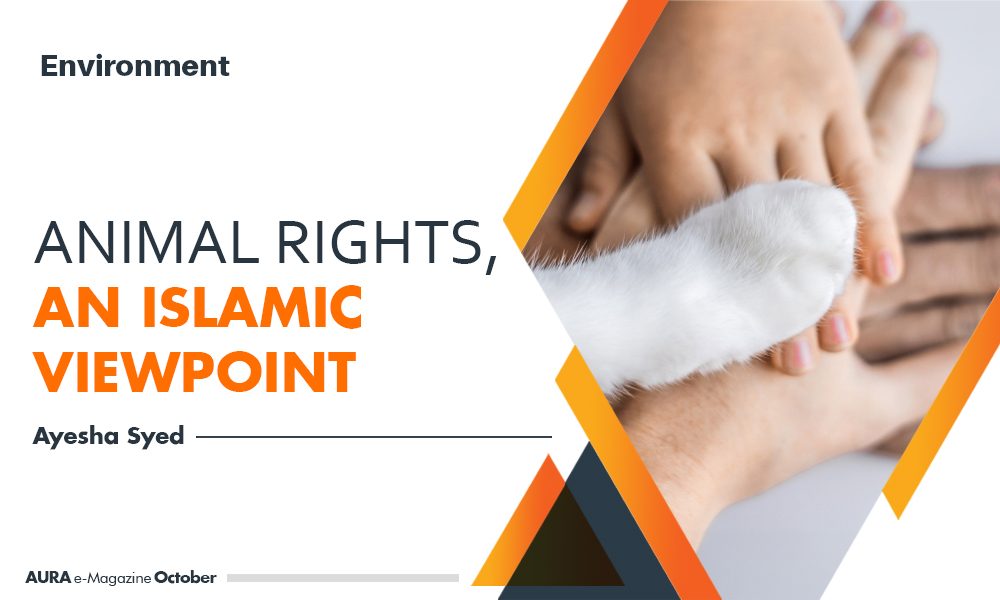Animals play an essential role in the Earth’s ecosystem. They contribute significantly to the environment from helping in pollination to maintaining the ecological balance. Beyond their environmental contributions, animals help out humans in ways that are subtle but profound. Some of them help psychologically by being companions in the form of pets, some by being a source of food, and some offer protection.
As Khalifas (stewards) on Earth, we are responsible for protecting and caring for these creatures. The need for animal rights arise because of the realisation that they can also feel. It stems from moral, environmental, and ethical consideration. The rights demand humane and respectful treatment of animals while acknowledging their intrinsic value and roles they play in the world.
Islam greatly emphasises kindness, mercy, and compassion towards all living beings. The teachings of Islam advocate for the responsible treatment of animals, especially as humans are considered Khalifa on Earth. We are expected to act with care and justice towards all of Allah’s creations. Animals are not merely resources for human use but are considered part of the wider creation, each with its role and purpose.
Animals as Part of Creation
“There is not an animal on the earth, nor a bird that flies on its wings, but they are communities like you.” (Quran, 6:38)
Allah in the Quran frequently reminds us that animals, like humans, are creatures of Allah. They are not lesser beings and must not be mistreated. The verse mentioned above emphasises that animals—whether on land, sea, or air— exist in organised communities, much like humans. This understanding forms the foundation for respecting them and acknowledging their role in the natural order.
At another place in the Quran, Allah says:
“Do you not see that Allah is glorified by whomever is within the heavens and the earth and (by) the birds with wings outspread? Each knows its salah (way of praying) and its tasbih (way of glorifying Him)…” (24:41)
This Ayah highlights the status of the animals. They are the creations of Allah and are accountable to Him in their own way, they pray to Him and are under His protection. Both humans and animals have been taught how to worship by their Creator.
What makes us different is free will and the ability to reason. Animals have been living and doing things in the same way that their Lord taught them since their creation. However, the point of the matter is, at our very core, animals and humans are alike. Hence, animals are deserving of our respect and kindness.
Rights to Protection from Harm and Cruelty
Senseless harming or killing of animals is strictly prohibited in Islam. While killing animals for food is permitted, but with strong rules to protect the animal from experiencing any suffering. If an animal is being used as food, it is strictly commanded to choose options that lead to least possible suffering.
The Prophet Muhammad (pbuh) said:
“Whoever kills a sparrow or anything bigger than that without a just cause, Allah will hold him accountable on the Day of Judgment.” (Sunan An-Nasa’i)
This hadith highlights the consequences of harming any animal, big or small. Modern Animal farming practices mostly involve cruel ways of hoarding animals in small cells and keeping them hungry and thirsty for hours, which are clear violations of this principle. Animals are also used for entertainment purposes in circuses and professional fights. Furthermore, keeping animals in zoos is raising a lot of questions regarding the protection of animals as it is claimed that zoos do not provide a safe environment for them raises concerns about animal welfare.
Humane Slaughter and Food Consumption
Islam lays out a stringent set of rules for slaughtering animals for food consumption purposes. The act of slaughter (zabiha) must be performed in the name of Allah, and the animal should not experience prolonged and unnecessary suffering. The Prophet (pbuh) instructed:
“When you slaughter, slaughter in the best manner. Sharpen your knife so the animal may be put to rest quickly.” (Sahih Muslim)
This hadith points towards the importance of treating animals with dignity, especially when they are being used as a means of food.
Responsibilities of Pet Ownership
While Islam allows the keeping of pets, it comes with great responsibility. Pet owners will be held accountable for carelessness towards the animals they possess. They must ensure their animals are well-fed, healthy, and cared for. Neglecting these responsibilities is considered sinful.
The same rules apply to animals that are used for transportation or work. The Prophet (pbuh) warned against overburdening animals, such as making them carry loads beyond their strength and making them work without rest. According to one hadith:
“Fear Allah regarding these animals that cannot speak. Ride them while they are in good condition and leave them in good condition.” (Abu Dawood)
Conclusion
In Islam, animals are seen as part of a larger creation of Allah, with rights and responsibilities owed to them by humans. Whether in their role in nature, for food, or work, animals are to be treated with care, kindness, and compassion. Animal cruelty is strongly condemned, and those who treat animals well are rewarded greatly.
These teachings align with scientific views on animal welfare and provide a moral framework for treating animals with dignity. Through these teachings, believers are reminded that how they treat other living beings reflects their character and faith.


0 Comments